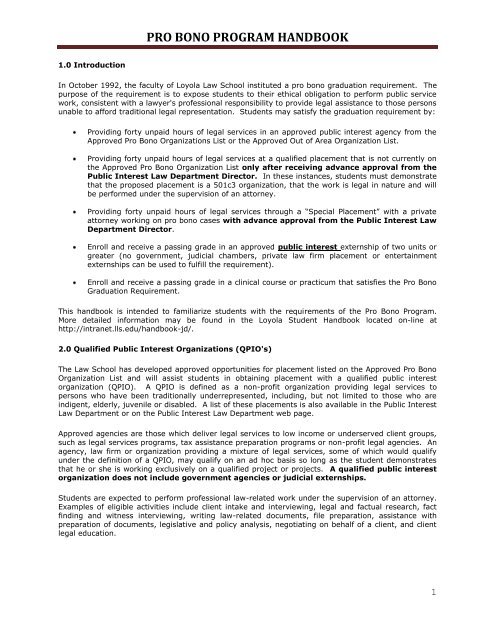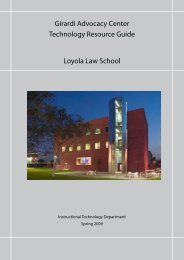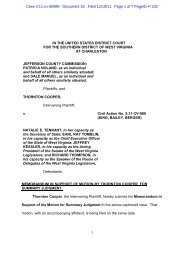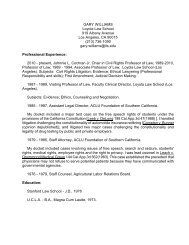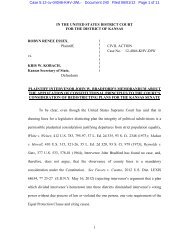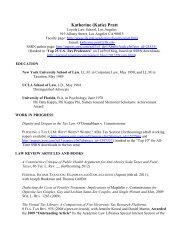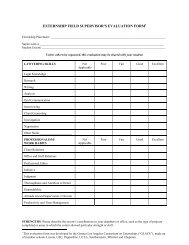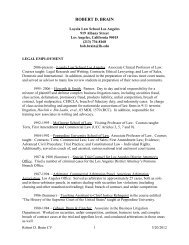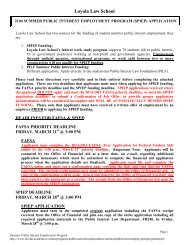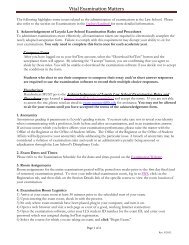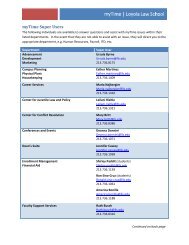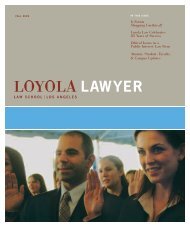PRO BONO PROGRAM HANDBOOK - Loyola Law School
PRO BONO PROGRAM HANDBOOK - Loyola Law School
PRO BONO PROGRAM HANDBOOK - Loyola Law School
You also want an ePaper? Increase the reach of your titles
YUMPU automatically turns print PDFs into web optimized ePapers that Google loves.
<strong>PRO</strong> <strong>BONO</strong> <strong>PRO</strong>GRAM <strong>HANDBOOK</strong><br />
1.0 Introduction<br />
In October 1992, the faculty of <strong>Loyola</strong> <strong>Law</strong> <strong>School</strong> instituted a pro bono graduation requirement. The<br />
purpose of the requirement is to expose students to their ethical obligation to perform public service<br />
work, consistent with a lawyer's professional responsibility to provide legal assistance to those persons<br />
unable to afford traditional legal representation. Students may satisfy the graduation requirement by:<br />
Providing forty unpaid hours of legal services in an approved public interest agency from the<br />
Approved Pro Bono Organizations List or the Approved Out of Area Organization List.<br />
Providing forty unpaid hours of legal services at a qualified placement that is not currently on<br />
the Approved Pro Bono Organization List only after receiving advance approval from the<br />
Public Interest <strong>Law</strong> Department Director. In these instances, students must demonstrate<br />
that the proposed placement is a 501c3 organization, that the work is legal in nature and will<br />
be performed under the supervision of an attorney.<br />
Providing forty unpaid hours of legal services through a “Special Placement” with a private<br />
attorney working on pro bono cases with advance approval from the Public Interest <strong>Law</strong><br />
Department Director.<br />
Enroll and receive a passing grade in an approved public interest externship of two units or<br />
greater (no government, judicial chambers, private law firm placement or entertainment<br />
externships can be used to fulfill the requirement).<br />
Enroll and receive a passing grade in a clinical course or practicum that satisfies the Pro Bono<br />
Graduation Requirement.<br />
This handbook is intended to familiarize students with the requirements of the Pro Bono Program.<br />
More detailed information may be found in the <strong>Loyola</strong> Student Handbook located on-line at<br />
http://intranet.lls.edu/handbook-jd/.<br />
2.0 Qualified Public Interest Organizations (QPIO's)<br />
The <strong>Law</strong> <strong>School</strong> has developed approved opportunities for placement listed on the Approved Pro Bono<br />
Organization List and will assist students in obtaining placement with a qualified public interest<br />
organization (QPIO). A QPIO is defined as a non-profit organization providing legal services to<br />
persons who have been traditionally underrepresented, including, but not limited to those who are<br />
indigent, elderly, juvenile or disabled. A list of these placements is also available in the Public Interest<br />
<strong>Law</strong> Department or on the Public Interest <strong>Law</strong> Department web page.<br />
Approved agencies are those which deliver legal services to low income or underserved client groups,<br />
such as legal services programs, tax assistance preparation programs or non-profit legal agencies. An<br />
agency, law firm or organization providing a mixture of legal services, some of which would qualify<br />
under the definition of a QPIO, may qualify on an ad hoc basis so long as the student demonstrates<br />
that he or she is working exclusively on a qualified project or projects. A qualified public interest<br />
organization does not include government agencies or judicial externships.<br />
Students are expected to perform professional law-related work under the supervision of an attorney.<br />
Examples of eligible activities include client intake and interviewing, legal and factual research, fact<br />
finding and witness interviewing, writing law-related documents, file preparation, assistance with<br />
preparation of documents, legislative and policy analysis, negotiating on behalf of a client, and client<br />
legal education.<br />
1
<strong>PRO</strong> <strong>BONO</strong> <strong>PRO</strong>GRAM <strong>HANDBOOK</strong><br />
3.0 Process For Completion<br />
3.1. Students may satisfy the Pro Bono requirement at qualified placements that are not<br />
currently approved only after receiving approval from the Public Interest <strong>Law</strong> Department<br />
Director. Students must demonstrate that the proposed placement satisfies the definition of a QPIO,<br />
and must obtain the advance approval of the Public Interest <strong>Law</strong> Department Director. All approved<br />
special placements must provide for student supervision by a licensed attorney through a QPIO.<br />
3.2. Students may not commence satisfying the pro bono requirement until the first year of day or<br />
evening studies is completed (i.e., no earlier than the Summer Session following the first year).<br />
3.3. All students must, without exception, complete the pro bono requirement prior to the last<br />
semester before graduation. Students cannot graduate until the pro bono requirement is completed.<br />
3.4. A student who has completed the first year of studies may elect the semester or Summer Session<br />
in which he or she wishes to begin performance of the requirement.<br />
The election of an approved pro bono organization or approved “Special Placement” is accomplished<br />
by filing a Statement of Intent form with the Public Interest <strong>Law</strong> Department once a position is<br />
secured..<br />
3.5. Students must begin performance of the requirement in the semester or Summer Session in<br />
which they file a Statement of Intent, subject to the availability of qualified placements.<br />
Day Division students who select the forty-hour option must complete the forty hours within two<br />
consecutive semesters (i.e., Fall and Spring), or within a consecutive semester and Summer Session.<br />
The second semester must be completed prior to the last semester before graduation.<br />
Evening Division students who select the forty-hour option may complete the requirement over<br />
several (consecutive or non-consecutive) semesters or Summer Sessions, provided they complete the<br />
forty hours prior to the last semester before graduation.<br />
3.6 Upon submission to the Public Interest <strong>Law</strong> Department of the fully completed and documented<br />
Student Log/Supervisory Form showing completion of the forty-hour option, the Public Interest <strong>Law</strong><br />
Department will notify the Office of the Registrar and completion of the pro bono requirement will be<br />
reflected on the official transcript of each student.<br />
3.7 Students electing to fulfill the Pro bono Graduation Requirement through a 2-unit or greater public<br />
interest externship or a clinical course or practicum which is deemed to meet the requirement, DO<br />
NOT NEED to submit any forms to the Public Interest <strong>Law</strong> Department. In those instances, students<br />
will automatically receive credit for satisfying the Pro Bono Graduation Requirement upon successful<br />
completion and passing of the course or practicum.<br />
4.0 Program Requirements and Policies<br />
4.1. The pro bono graduation requirement must, without exception, be completed prior to the last<br />
semester before graduation as set forth in Section 3.3 above.<br />
4.2. Completion of the pro bono graduation requirement will not be waived for any student.<br />
4.3. In the Spring semester of each academic year, first year students will be provided with a copy of<br />
the Pro Bono Program Student Handbook, which explains the details of the graduation requirement,<br />
the options available to satisfy the requirement, how to select and confirm a placement, and deadlines<br />
for completion of the requirement.<br />
2
<strong>PRO</strong> <strong>BONO</strong> <strong>PRO</strong>GRAM <strong>HANDBOOK</strong><br />
4.4. Students must read and review all pro bono graduation requirements and policies prior to<br />
selecting and confirming a placement option. Students must submit and file the Statement of Intent<br />
form with the Public Interest <strong>Law</strong> Department to commence satisfaction of the requirement.<br />
4.5. To receive credit for completion of the pro bono requirement, students must provide<br />
documentation of legal services on forms provided in the Public Interest <strong>Law</strong> Department or on the<br />
Public Interest <strong>Law</strong> Department web page. All documented hours must be verified by the placement<br />
supervising attorney; unverified hours do not count towards completion of the requirement.<br />
4.6. Students electing to satisfy the requirement by enrolling in at least two units of an approved<br />
public interest externship must complete all externship requirements pursuant to the "<strong>Loyola</strong> <strong>Law</strong><br />
<strong>School</strong> Externship Program Policies and Procedures."<br />
4.7. All legal services provided under the pro bono requirement must be performed in a professional<br />
manner consistent with the requirements of the placement and the professional ethical obligations of a<br />
law student seeking application for entry into the legal profession. Failure to conform to professional<br />
standards will result in failure to complete the pro bono graduation requirement.<br />
4.8. Supervision standards for all pro bono placements are the same as those contained in the manual<br />
for field supervisors prepared by the Externship Department (Please see the Glace Supervision Manual<br />
located on the Externship Department web page at http://www.lls.edu/glace/.<br />
4.9. All students providing legal services pursuant to the pro bono requirement are insured pursuant<br />
to a <strong>Law</strong>yers Professional Liability Insurance policy. The policy is carried by the Externship Department<br />
for externship and pro bono students.<br />
3


